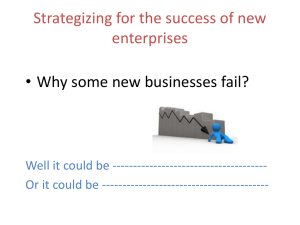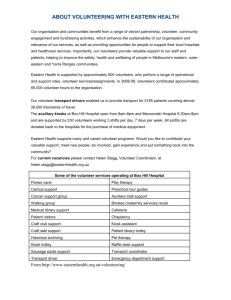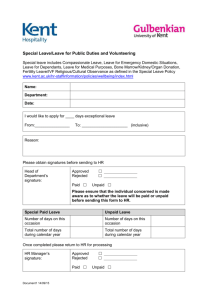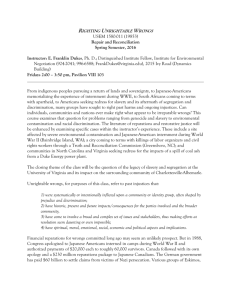Letter to Department of Justice, Wrongs Act 1958
advertisement
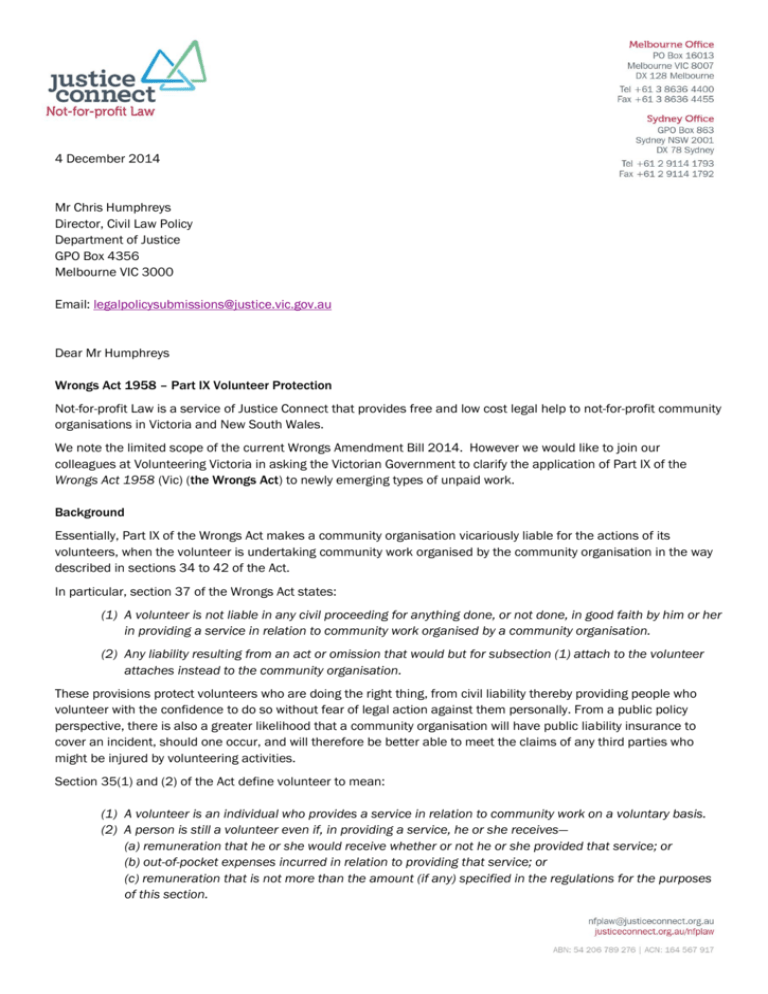
4 December 2014 Mr Chris Humphreys Director, Civil Law Policy Department of Justice GPO Box 4356 Melbourne VIC 3000 Email: legalpolicysubmissions@justice.vic.gov.au Dear Mr Humphreys Wrongs Act 1958 – Part IX Volunteer Protection Not-for-profit Law is a service of Justice Connect that provides free and low cost legal help to not-for-profit community organisations in Victoria and New South Wales. We note the limited scope of the current Wrongs Amendment Bill 2014. However we would like to join our colleagues at Volunteering Victoria in asking the Victorian Government to clarify the application of Part IX of the Wrongs Act 1958 (Vic) (the Wrongs Act) to newly emerging types of unpaid work. Background Essentially, Part IX of the Wrongs Act makes a community organisation vicariously liable for the actions of its volunteers, when the volunteer is undertaking community work organised by the community organisation in the way described in sections 34 to 42 of the Act. In particular, section 37 of the Wrongs Act states: (1) A volunteer is not liable in any civil proceeding for anything done, or not done, in good faith by him or her in providing a service in relation to community work organised by a community organisation. (2) Any liability resulting from an act or omission that would but for subsection (1) attach to the volunteer attaches instead to the community organisation. These provisions protect volunteers who are doing the right thing, from civil liability thereby providing people who volunteer with the confidence to do so without fear of legal action against them personally. From a public policy perspective, there is also a greater likelihood that a community organisation will have public liability insurance to cover an incident, should one occur, and will therefore be better able to meet the claims of any third parties who might be injured by volunteering activities. Section 35(1) and (2) of the Act define volunteer to mean: (1) A volunteer is an individual who provides a service in relation to community work on a voluntary basis. (2) A person is still a volunteer even if, in providing a service, he or she receives— (a) remuneration that he or she would receive whether or not he or she provided that service; or (b) out-of-pocket expenses incurred in relation to providing that service; or (c) remuneration that is not more than the amount (if any) specified in the regulations for the purposes of this section. The volunteer protections in the Wrongs Act only apply to people who meet this definition. However there are some exclusions set out in the legislation (eg. people who do community work under court order, emergency volunteers) and this is presumably because different insurances are available to cover these scenarios. New types of unpaid work There are a number of programs that allow or require people to undertake unpaid work for community organisations, however it is unclear whether such participants technically meet the definition of volunteer set out in s 35 of the Wrongs Act. These include: People who may be issued with a Work and Development Permit via the new program introduced by the Fines Reform Act 2014 (Vic) in the future – we understand that under this program a person may perform unpaid work at an accredited not-for-profit community organisation to work off their infringement fines; Work for the dole participants under the Federal Government program - participants may perform unpaid work for a Victorian community organisations to receive Centrelink payments (this is a mandatory scheme); Mutual obligation volunteers - a non-mandatory, Centrelink program whereby people who are aged over 55 can elect to ‘volunteer’ at an approved community organisation in Victoria in order to meet their ‘work activity requirements’ to continue to receive Centrelink payments. Some of these programs are mandatory for participants, which does not fit with the definition of community work performed on a voluntary basis. Some of these programs also have an element of ‘payment’ which is over and above the ‘out of pocket expenses only’. (It is noted that the payment does not flow from the community organisation to person performing unpaid work but is rather in the form of the continued payment of a benefit or the reduction of debt which is referential to the unpaid work). Given this, it is not clear whether people participating in these programs will be considered ‘volunteers’ for the purposes of the section 35 definition and Part IX of the Wrongs Act. Example scenarios The following two examples illustrate this point: If a Work and Development Permit participant, while performing community work for a community organisation (as defined in Part IX of the Wrongs Act) accidently dropped a large, donated piece of furniture in circumstances which seriously injured a member of the public, would section 37 of the Wrongs Act apply? If a Work for the Dole participant, while performing community work for a Victorian community organisation (as defined in Part IX of the Wrongs Act), inadvertently injured a member of the public while undertaking landscape gardening tasks, would section 37 of the Wrongs Act apply? Request for clarification We would be pleased if consideration was given to amending Part IX of the Wrongs Act to clarify whether section 37 applies to these new types of unpaid work. This is a public policy issue with implications for the Victorian public, the people who participate in unpaid work programs and for Victorian not-for-profit community organisations. We think Part IX of the Wrongs Act should protect these unpaid work participants, in the same way it protects traditional volunteers. If the government does not wish to make these amendments to clarify the application of Part IX of the Wrongs Act, we would urge the Victorian Government to check to ensure that there are alternative protections for these kinds of unpaid work (eg. in the same way that emergency volunteers have been excluded as alternative protections apply). Please do not hesitate to contact me on 03 8636 4453 or liz.morgan@justiceconnect.org.au if you have any questions or require further information. Yours sincerely Liz Morgan Senior Lawyer Not-for-profit Law JusticeConnect


